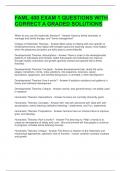FAML 400 EXAM 1 QUESTIONS WITH
CORRECT A GRADED SOLUTIONS
When do you use the hedonistic theories? - Answer-Used by family scientists, in
marriage and family therapy, and "home management"
Critique of Hedonistic Theories: - Answer-Most useful in helping with very specific or
limited phenomena, less helpful with broader topics like teaching values; most helpful
when the pleasures and pains are fairly easy to control/identify
Developmental Theories: Assumptions - Answer-There is order to the developmental
patterns of individuals and families, belief that people and individuals can improve
through healthy maturation and growth (general onward and upward feel to these
theories)
Developmental Theories: Concepts - Answer-developmental task, family life cycle,
stages, transitions, norms, roles, positions, role sequence, structure, career,
boundaries, epigenesis, and families being stuck, or arrested, in their development
Developmental Theories: How it works? - Answer-It explains variations and patterns in
family and individual development
Developmental Theories: Critique - Answer-narrow, less general theory; not widely used
in research
Humanistic Theories: Assumptions - Answer-humans are normally inherently good,
Humanistic Theories: Concepts - Answer-self, real self, perceived self, ideal self, self-
actualization, active listening (reflective listening), I-statements, and You- statements
Humanistic Theories: Propositions - Answer-Humans have an inherent drive to improve,
grow, and develop,
Humanistic Theories: How is works? - Answer-The best way to "Help" a family is to
create an atmosphere of safety and Love - this environment will free people to continue
to progress, includes active listening concept.
Humanistic Theories: Critique - Answer-This theory is reaction to the hedonistic and
mechanical approaches, optimistic view of humans - human condition consists of peace
and growth
, Symbolic Interaction Theories: Assumptions - Answer-1. Humans live in a symbolic
environment as well as a physical environment, and they acquire complex sets of
symbols in their minds.
2. Humans value.
3. Symbols are important in understanding human behavior.
4. Humans are reflexive (they think about themselves), and their introspection gradually
creates a definition of self.
Symbolic Interaction Theories: Concepts - Answer-self, society, mind, the "I" and "me,"
values, roles, norms, meaning, perceptions, definitions, role expectations, role behavior,
role making, and identity
Symbolic Interaction Theories: Propositions - Answer-The more clear a persons
expectations are about a new role, the more easily they move into that role; the stronger
people value something, the more they will be influenced by it; in relationships there
should be a consensus on their perceptions; role enactment = level of satisfaction in
relationship
Symbolic Interaction Theories: How is Works? - Answer-helps explain complicated
behavior by taking the individuals perceptions into account
Symbolic Interaction Theories: Critique - Answer-Very popular, basic philosophy of life
Family-systems Theory: Assumptions - Answer-holistic perspective, there are enough
regularities in the the functioning of parts and wholes that it's beneficial to study them,
focuses on studying the complexities of relationships
Family-systems Theory: Concepts - Answer-input, output, feedback, rules of
transformation, and boundaries, individuation, mystification, paradoxical bonding,
double bind, complementary and parallel relationships, metacommunication, rules and
metarules, boundaries, openness, pseudomutuality, coalition, and triangulation,
information and energy flows, resources, mesosystem, adaptation, goals, standards,
consumption, and styles of decision-making, microsystem, mesosystem, and
macrosystem
Family-systems Theory: Propositions - Answer-Homeostasis hypothesis (resistance to
change), paradoxical communication: emotional upset when influential members of the
family send mixed messages
Family-systems Theory: How is works? - Answer-For practitioners seeking to make a
difference in family life, the ecological branch is useful in government and industrial
settings
Family-systems Theory: Critique - Answer-Downside: gender issues and abusive
processes in family systems were ignored in this perspective; little attention was paid to




